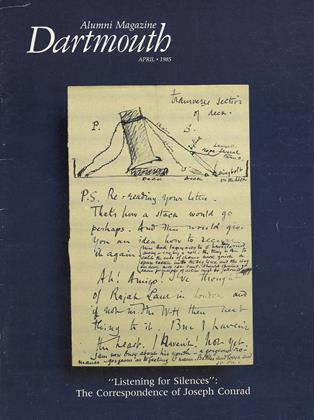"It is important to bring to campus speakers from different perspectives," says government instructor Robert Arseneau following a recent, visit to Han over by Faith Whittlesey, the highestranking woman in the Reagan White House. Her visit was sponsored by a group whose purpose over its 15-year history has been to bring conservative speakers to Dartmouth. Whittlesey, special assistant to President Reagan for public liaison, spoke to an audience of 75 at the Rockefeller Center, which cosponsored her talk. She posed the question "A Communist Central America should we turn our back?" Her answer was clearly the administration's: absolutely not.
"Sometimes I agree with [the conservative speakers] and sometimes I disagree with them. But I always go watch everything," notes Arseneau. There were, indeed, some on campus who disagreed with what Whittlesey had to say. Following her visit, two letters to the editor of The Dartmouth took issue with her view that helping the Nicaraguan freedom fighters overthrow the Sandinista government is vital to our national security as well as to our world image.
But thoughtful controversy is just what the group which brought Whittlesey to campus would like to foster. For most of its history known as the Committee for Intellectual Alternatives, the group attempts "to confront Dartmouth students with points of view they aren't usually exposed to," says Tuck professor Dennis Logue, who chaired the committee for a year and is still active with it.
The group had its genesis with two members of the class of '29 Harold Ripley and the late John Cook. According to Ripley, he and Cook who both had sons at Dartmouth at the time were disturbed by what they perceived as the predominating liberalism on campus in the late sixties and early seventies. They decided that the responsible conservative voice needed some financial support and came up with the funds through the John Brown Cook Foundation, which backs conservative causes and was headed by Ripley's classmate.
During the decade and a half since then, the group has gone through periods of more and less activity. Some speakers it has brought to Hanover have attracted sizable crowds. When political economist George Gilder came two years ago, there was a good turnout. But a visit by Thomas Etzold of the Naval War College only brought out a couple dozen listeners. In the past year, how ever, the group has been in a period of revival. Ripley took over the leadership of the committee he admits that being retired, he has time to put into organizational matters and he has attracted a prominent roster of speakers. Edward Rollins, manager of the Reagan-Bush reelection campaign, came to Hanover just a few weeks before the November election. Frank Smallwood '5l, director of the Rockefeller Center, which cosponsored that event as well, said the turnout was so good that "students were crowded over the railings, the place was so packed." Other speakers during the past year have included Gerald Carmen, U.S. ambassador to the United Nations in Geneva, and Charles Murray, a fellow at the Manhattan In stitute and author of the controversial treatise on the welfare system, LosingGround.
"It is always interesting for me to have a chance to observe first-hand the people I see in the news," comments Arseneau. "I always go watch everything." Another government instructor, Evelyn Fink, feels that the committee's "main contribution is their White House connections, which are very impressive." Ripley agrees that the group has "really had some stars" this year but wonders "if we can keep it up." In the next breath, though, he notes that he's "working on a cabinet member," though he declines to discuss specifics. One thing he is eager to talk about, however, is his commitment to making a place for thoughful, responsible conservatism at Dartmouth, and he's especially pleased by the Rockefeller Center's cosponsorship of the committee's events this year.
Arseneau's interest in attending those events, he notes, doesn't necessarily imply an endorsement of the group's ideological focus, but he readily offers an "endorsement of the diversity of opportunity" the committee makes possible.
The 1985 Alumni Fund A Progress Report Dollar Goal: $12,000,000 As of March 11: $5,551,000 Participation Goal: 70% As of March 11: 24% Reunion Class Leaders 1935: $6llOOO1960: $530,0001965: $245,000 Noil-reunion Glass Leaders 1958: $137,0001952: $107,0001961: $BB,OOO
 View Full Issue
View Full Issue
More From This Issue
-
 Cover Story
Cover StoryListening for the Silences
April 1985 By Laurence Davies -
 Feature
FeatureMinimum Standards
April 1985 By Gayle Gilman '85 -
 Feature
FeatureKey to Success: Dartmouth's Athletic Sponsor Program
April 1985 By Jim Kenyon -
 Feature
FeatureHistorical Notes on the Upper Valley
April 1985 By Jerold Wikoff -
 Feature
FeatureFROM THE DESK OF THE PRESIDENT
April 1985 -
 Article
ArticleWorth his salt
April 1985 By JOseph Berman '86
Article
-
 Article
ArticleWHO'S WHO IN THE FACULTY
November, 1922 -
 Article
ArticleSpring has come to Balch Hill
-
 Article
ArticleVALEDICTORY SPEAKER
JUNE 1965 -
 Article
ArticleWild Navigation
SEPTEMBER | OCTOBER 2015 By —Marley Marius ’17 -
 Article
ArticleTuck School
NOVEMBER 1971 By BOB KIMBALL T'48 -
 Article
ArticleRamon Guthrie's New Poem
DECEMBER 1970 By James M. Reid '24


